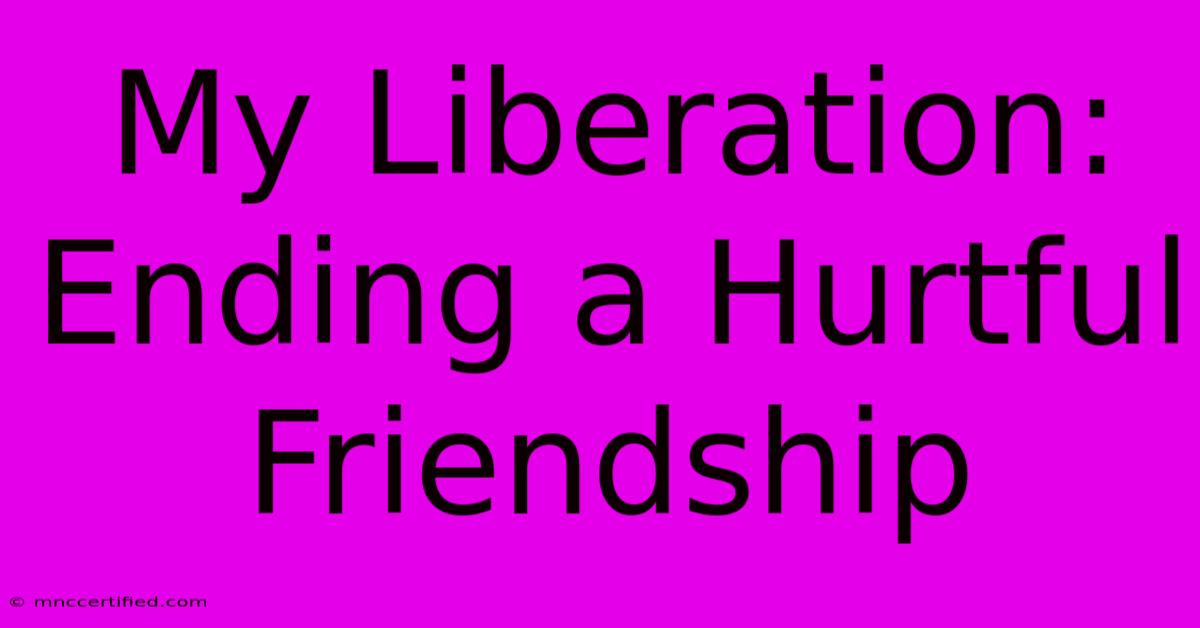My Liberation: Ending A Hurtful Friendship

Table of Contents
My Liberation: Ending a Hurtful Friendship
Ending a friendship, especially one that has been long-standing, can be incredibly painful. But sometimes, for your own well-being and mental health, it's a necessary act of self-preservation. This article explores the complex emotions involved in ending a hurtful friendship, offering guidance and support for navigating this difficult process.
Recognizing a Hurtful Friendship: The Warning Signs
Before you consider ending a friendship, it's crucial to honestly assess the relationship. Are you consistently feeling drained, unhappy, or even anxious after interacting with this person? Here are some key warning signs that your friendship may be toxic:
- Constant Criticism and Negativity: Does your friend frequently criticize you, your choices, or your life? Do they consistently focus on the negative aspects of situations?
- One-Sided Relationship: Do you feel like you're constantly giving more than you're receiving? Is the friendship mostly about their needs and rarely about yours?
- Disrespect and Boundary Violations: Does your friend regularly disregard your boundaries or disrespect your feelings? Do they make you feel uncomfortable or unsafe?
- Manipulation and Control: Does your friend try to manipulate your thoughts, feelings, or actions? Do they try to control your behavior or decisions?
- Lack of Support: Do you feel unsupported or judged when you share your struggles or vulnerabilities? Is your friend consistently unavailable when you need them?
- Jealousy and Competition: Does your friend exhibit excessive jealousy or try to compete with you in various aspects of your life?
The Emotional Rollercoaster: Preparing for the Conversation
Ending a friendship is rarely easy. You'll likely experience a range of emotions, including guilt, sadness, anger, and even relief. Acknowledge these feelings; they are valid. Allow yourself time to process them before initiating the conversation.
Tips for Preparing:
- Identify your reasons: Clearly articulate why you're ending the friendship. Having a clear understanding of your reasoning will help you stay focused during the conversation.
- Plan what you will say: While you don't need a script, having a general idea of what you want to convey can help prevent emotional outbursts or rambling.
- Choose the right time and place: Select a time and place where you both feel comfortable and can have a private conversation free from distractions.
- Prepare for their reaction: Be prepared for a range of reactions, from anger and defensiveness to sadness and acceptance. Try to remain calm and respectful, even if they react negatively.
- Prioritize self-care: Remember to prioritize your self-care throughout this process. Engage in activities that help you relax and de-stress.
Having the Difficult Conversation: Setting Boundaries
This is the hardest step, but it's crucial to be direct and honest, while also remaining respectful. Avoid blaming or attacking. Focus on your feelings and experiences.
Strategies for a Productive Conversation:
- Use "I" statements: Focus on your feelings and experiences using "I" statements. For example, instead of saying "You always make me feel bad," try "I feel hurt when..."
- Be clear and concise: State your reasons for ending the friendship clearly and concisely. Avoid beating around the bush.
- Set boundaries: Clearly state your boundaries moving forward. This might involve limiting contact or completely cutting off communication.
- Listen to their perspective (if appropriate): While you are ending the friendship, allowing them a chance to express their feelings (if they choose to) can provide closure for both of you. However, if the conversation becomes toxic or abusive, disengage respectfully.
- Be prepared to walk away: If the conversation becomes unproductive or harmful, be prepared to end the conversation and distance yourself.
Moving Forward: Healing and Self-Reflection
After ending the friendship, allow yourself time to heal. This is a significant change and requires time and self-compassion.
Post-Breakup Self-Care:
- Allow yourself to grieve: Allow yourself to feel the sadness and loss associated with ending the friendship. Don’t suppress your emotions.
- Focus on self-care: Engage in activities that nourish your mind, body, and soul. This could include exercise, spending time in nature, pursuing hobbies, or connecting with supportive friends and family.
- Seek support: If you are struggling to cope with the emotional impact, consider seeking support from a therapist or counselor.
- Reflect on the experience: Reflect on the lessons learned from the friendship and how you can apply them to future relationships. This will help you build healthier, more fulfilling connections.
Ending a hurtful friendship is a courageous act of self-love. By recognizing the signs, preparing for the conversation, and focusing on self-care, you can navigate this difficult process and create space for healthier relationships in your life. Remember, your well-being is paramount.

Thank you for visiting our website wich cover about My Liberation: Ending A Hurtful Friendship. We hope the information provided has been useful to you. Feel free to contact us if you have any questions or need further assistance. See you next time and dont miss to bookmark.
Featured Posts
-
Godfather Brandos Real Life Rage
Dec 29, 2024
-
Golf Star Schefflers Holiday Hiccup
Dec 29, 2024
-
Spurs Wembanyamas Nyc Chess Match
Dec 29, 2024
-
Miami Qb Wards Record Breaking Td
Dec 29, 2024
-
Expert Model Predicts Miami Vs Iowa State
Dec 29, 2024